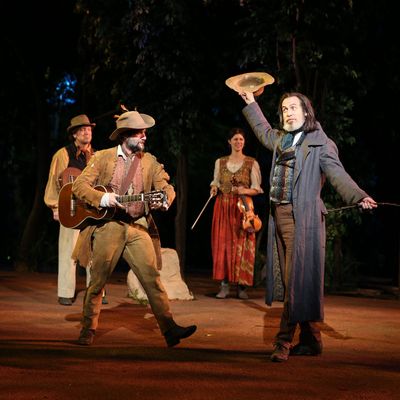
As You Like It is a crowd-pleaser by charter. (ItÔÇÖs right there in the title.) And director Daniel Sullivan, after two summers of moodier outings in the Park (The Merchant of Venice, AllÔÇÖs Well That Ends Well), has taken that brief very seriously indeed: ThereÔÇÖs nothing here but pleasure and pleasantry, making it a fine but minor dish on his long table of Delacorte delicacies. Working off a faintly cartoonish ÔÇ£Frontierland!ÔÇØ theme ÔÇö rifles, slouch hats, and the sort of oily buckskins and asphyxiating corsetry that slow-cook actors right before your eyes ÔÇö Sullivan has delivered a consistently winning, persistently inconsequential production of ShakespeareÔÇÖs wooliest cross-dressing comedy, to the amiable autopilot beat of Steve MartinÔÇÖs toothsome bluegrass tunes. (Martin, it turns out, is quite the gifted melodist when heÔÇÖs working with the right lyricist.)
AYLI is, of course, a glorious piece of literature (ÔÇ£All the worldÔÇÖs a stage ÔǪ ,ÔÇØ ÔÇ£Your ÔÇÿifÔÇÖ is the only peacemaker; much virtue in ÔÇÿifÔÇÖÔÇØ), full of deep summer magic: an interchangeable pair of Dukes (both played by Andre Braugher), one a cruel banisher, one happily banished, more alike than different; a magical forest thatÔÇÖs enchanted with humanism and biophilia (not cheap fairy magic), and gorgeous lyric reveries on the paradox of any paradise that has people in it. But the play, in production, nonetheless cries out for a firm hand ÔÇö and, finding none, immediately begins to ramble into a series of jam-band-style virtuoso solos.
Then again, you couldnÔÇÖt ask for better soloists. Lily RabeÔÇÖs hyperactive drag-king Rosalind and Stephen SpinellaÔÇÖs brooding ex-libertine Jaques both succeed, the first by busily aiming to please, the second by barely moving a muscle. Rabe is, strictly speaking, too throaty and wry and self-possessed a grown-up for the girlish, puckish Rosalind, but she compensates by approaching ShakespeareÔÇÖs craftiest comic heroine as an adult given a second shot at childhood. SheÔÇÖs got velvety chemistry with her love object, the likable lunk Orlando (a charming, sincere David Furr), and a peppy if somewhat empty dynamic with bosom pal Celia (Good PeopleÔÇÖs good girl Renee Elise Goldsberry), her cousin, childhood pal.
Why empty? Well, to develop Rosalind and CeliaÔÇÖs relationship into something substantial, weÔÇÖd need a better notion of whatÔÇÖs at stake in the wider world of the play┬áÔÇö Rosalind being the gentle DukeÔÇÖs daughter and Celia the usurping tyrantÔÇÖs. This is where we reach the ragged frontier of SullivanÔÇÖs frontier: What does it really mean to set As You Like It on the cusp of American ÔÇ£Manifest DestinyÔÇØ? It could mean a great many things, most of them a bit grim. But while men in gray wool walk the palisade, rifles at the ready, we never get any sense of what theyÔÇÖre afraid of, what theyÔÇÖre guarding against, or what theyÔÇÖre preparing to conquer. Despite the fact that OrlandoÔÇÖs abusive older brother Oliver (Omar Metwally) dresses like Simon Legree (and, later, receives a compensatory lashing from a black authority figure), thereÔÇÖs no serious injection of slavery into the mix of oaty images. (And absolutely no Native Americans, of course: That would certainly make Arden a more morally complex forest than this production could handle.) Darkness arrives only in the form of prerecorded cinematic underscoring, a crutch Sullivan uses so invisibly and effectively, year after year, we barely notice that it is, in fact, a crutch. The entire framing concept is something of a dodge, a matte painting of a fake sunset. ┬á ┬á
But I carp, ill-temperedly and Jaques-like. Sure, this may not be the most robust As You Like It ever staged, but it is damned near impossible not to like. Who can resist Oliver PlattÔÇÖs vinegary Touchstone, the epicurean court jester unleashed on the unsuspecting ÔÇ£country copulativesÔÇØ of the forest. And how about those copulatives? Will Rogers, Jon DeVries, and the irrepressible Donna Lynne Champlin (as the insult-proof walking farmerÔÇÖs-daughter joke Audrey) all get their licks in as rude herdsfolk with foibles of their own. The forest twitches to the relentless picking-and-grinning of a roving bluegrass band, organized flawlessly by music director Tony Trischka and fronted by warbling bard Amiens (Jesse Lenat). And then, of course, thereÔÇÖs SpinellaÔÇÖs Jaques, the downer. His impact somewhat amputated by the productionÔÇÖs staunch refusal to consider itself as anything more than shimmery summer entertainment, Spinella (barely recognizable beneath a razor-sharp two-tone chin-beard) still manages to anchor all the merriment in something a shade less transient. ÔÇ£More,ÔÇØ calls Jaques to the smiling picker-grinners when the music stops, his voice as devoid of excitement as a becalmed pond, ÔÇ£more.ÔÇØ He asks for more, but his tone says ÔÇ£enough.ÔÇØ Maybe heÔÇÖs right, twice-over.

